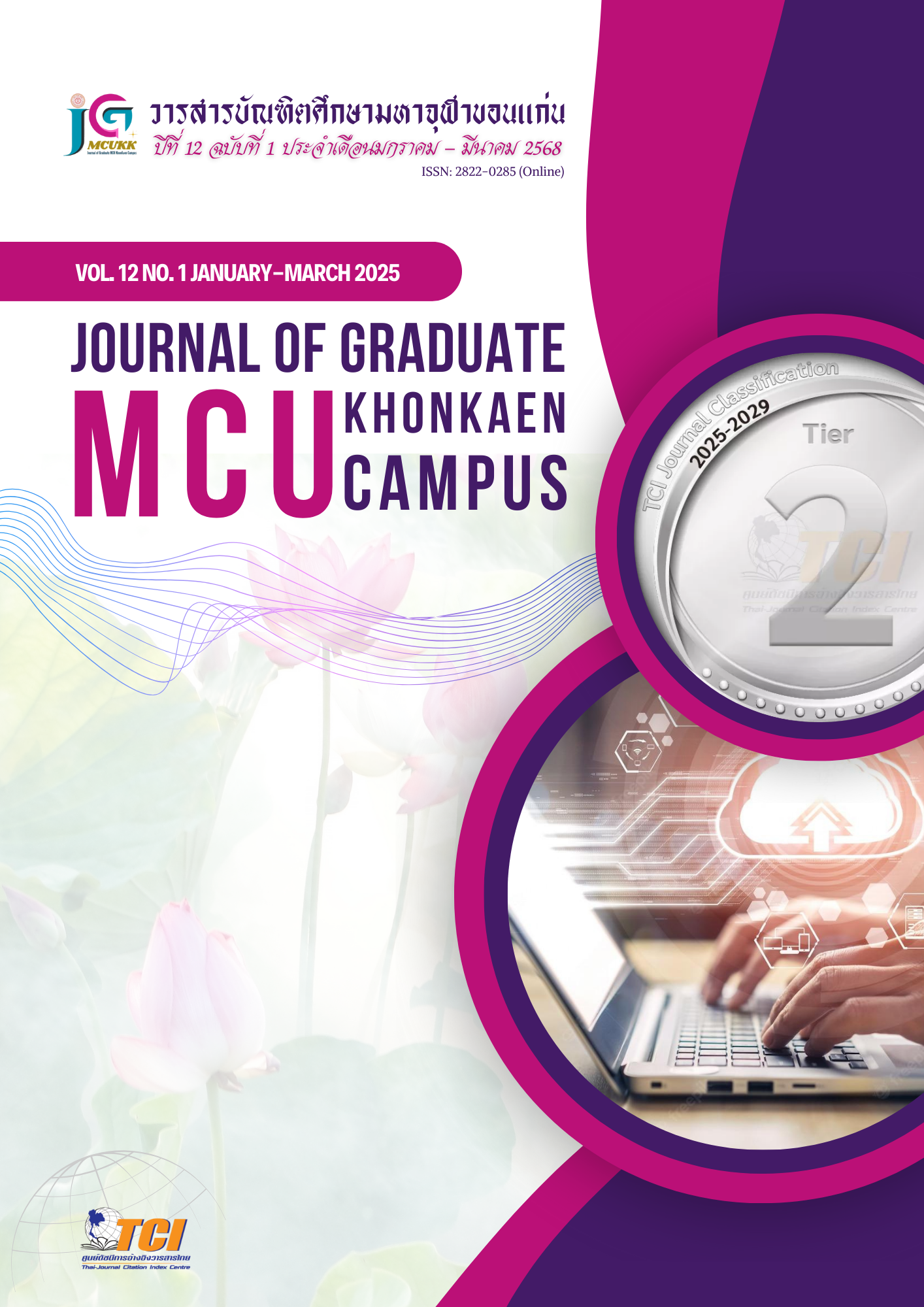The Effect of Using Problem Based Learning (PBL) and Flipped Classroom Approach to wards Problem Solving Competency and Achievement Learning in Chemistry Subject of Engineering Faculty Undergraduates, Northeastern University
Main Article Content
Abstract
The objectives of this research were : 1) to compare the mean scores of problem solving competency after received management learning by using Problem Based Learning (PBL) and Flipped Classroom Approach that the set criteria of 70% and
2) to compare the mean scores undergraduates achievement Learning in Chemistry Subject of pretest and posttest that received management learning by using Problem Based Learning (PBL) and Flipped Classroom Approach. The samples were 30
undergraduates from Engineering Faculty, Northeastern University the first semester, academic year 2024 that cluster sampling. The research design of this research was one-group pretest-posttest design. Research instruments, including 1. Problem Based Learning (PBL) and Flipped Classroom Approach lesson plan, 2. Test of problem solving ability, and 3. Test of Achievement Learning in Chemistry subject. Data were analyzed including, percentage, mean, standard deviation, and dependent t-test.
The results of this research indicated that
1) the mean scores of problem solving competency after management learning by using Problem Based Learning (PBL) and Flipped Classroom Approach was 81.06 % higher than the set criteria of 70%
2 The sample taught with Problem Based Learning (PBL) and Flipped Classroom Approach at posttest period learning had higher academic achievement in chemistry than a pretest period learning with a statistical significance level of .05
Article Details

This work is licensed under a Creative Commons Attribution-NonCommercial-NoDerivatives 4.0 International License.
References
กมลชนก จันทร, เชษฐ์ ศิริสวัสดิ์ และ ปริญญา ทองสอน. (2565). ผลของการจัดการเรียนรู้วิชาเคมีโดยใช้ปัญหาเป็นฐานที่มีต่อสมรรถนะการแก้ปัญหาแบบร่วมมือ และผลสัมฤทธิ์ทางการเรียนวิชาเคมีของนักเรียนระดับชั้นมัธยมศึกษาปีที่ 5. วารสารศึกษาศาสตร์ มหาวิทยาลัยศิลปากร, 20(1),
-158. https://so02.tci-thaijo.org/index.php/suedujournal/article/view/249322
พงษ์ลัดดา ปัญญาจิรวุฒิ และ วันวิสาห์. (2566). การศึกษาผลการจัดการเรียนรู้แบบห้องเรียนกลับด้านที่มีต่อผลสัมฤทธิ์ทางการเรียนรายวิชาฟิสิกส์ร่วมสมัย. วารสารศึกษาศาสตร์ มหาวิทยาลัยศิลปากร, 21(1), 204-221. https://so02.tci-thaijo.org/index.php/suedujournal/
article/view/256391
ทิพย์สุดา ชื่นชม และ รุ่งลาวัลย์ ละอําคา. (2567). การจัดกิจกรรมเสริมประสบการณ์โดยใช้แนวคิดเชิงออกแบบเพื่อส่งเสริมความสามารถในการคิดแก้ปัญหาของเด็กปฐมวัย. วารสารวิชาการและวิจัยมหาวิทยาลัยภาคตะวันออกเฉียงเหนือ, 14(3), 26-39. https://so04.tci-thaijo.org/index.
php/neuarj/article/view/271852
รุ่งรัตน์ ธรรมทอง. (2567). แผนการเรียนรู้ของรายวิชาเคมี EN10331 ภาคเรียนที่ 1 ปีการศึกษา 2567 : NEU-QF3. คณะวิศวกรรมศาสตร์ มหาวิทยาลัยภาคตะวันออกเฉียงเหนือ.
วรัทยา มณีรัตน์ และ ปิยรัตน์ ดรบัณฑิต. (2560). การพัฒนาทักษะกระบวนการแก้โจทย์ปัญหาเคมี เรื่อง กรด-เบส โดยใช้ กระบวนการแก้ปัญหาของโพลยาสําหรับนักเรียนชั้นมัธยมศึกษาปีที่ 5. วารสารหน่วยวิจัยวิทยาศาสตร์ เทคโนโลยี และสิ่งแวดล้อม เพื่อการเรียนรู้, 8(2), 297-306.
https://ejournals.swu.ac.th/index.php/JSTEL/article/view/9637
Akcay ,B and Benek, I.(2024). Problem-Based Learning in Türkiye: A Systematic Literature Review of Research in Science Education. Education Science, 14,330. 1-26. https://doi.org/10.3390/educsci14030330
Alqahtani,T.M, Yusop,F.D. & Halil,S.H. (2023). Content validity of the Constructivist Learning in Higher Education Settings (CLHES) scale in the context of the flipped classroom in higher education. Human & Social Sciences Communication, 1-12.
https://doi.org/10.1057/s41599-023-01754-3
Calleja, M., Cordell, M.O., Teves, J.M., Yap, S.A., Chua, U., & Bernardo, A. (2023). Addressing the Poor Science Performance of Filipino Learners: Beyond Curricular and Instructional Interventions. https://animorepository.dlsu.edu.ph/res_aki/91/
Dogan,Y.,Batdi, V. and Yasar, M-D. (2023). Effectiveness of flipped classroom practices in teaching of science: a mixed research synthesis. Research in Science & Technological Educatiom, 41(1), pp. 393-421. https://www.tandfonline.com/doi/
full/10.1080/02635143.2021.1909553
Eichler, J.F., Peeples, J. (2016). Flipped classroom modules for large enrollment general chemistry courses: a low barrier approach to increase active learning and improve student grades. Chem Educ Res Pract, 17(1), 197-208.
Merritt, J., Lee, M. Y., Rillero, P., & Kinach, B. M. (2017). Problem-Based Learning in K-8 Mathematics and Science Education: A Literature Review. Interdisciplinary Journal of Problem-Based Learning, 11(2). https://doi.org/https://doi.org/
7771/1541-015.1674
Raman, Y., Surif, J., Ibrahim, N.H. (2024). The Effect of Problem Based Learning Approach in Enhancing Problem Solving Skills in Chemistry Education: A Systematic Review. International Journal of Interactive Mobile Technologies (iJIM), 18(5), 91–111. https://doi.org/10.3991/ijim.v18i05.47929
Suwannoi, P. (2021). Supporting document for teaching and learning development project “Problem Based Learning”. https://ph.kku.ac.th/thai/images/file/km/pbl-he-58-1.pdf
Wijarn, P. (2013). Ways to create learning for students in the 21st century. Bangkok: Thada Publication. (in Thai)

